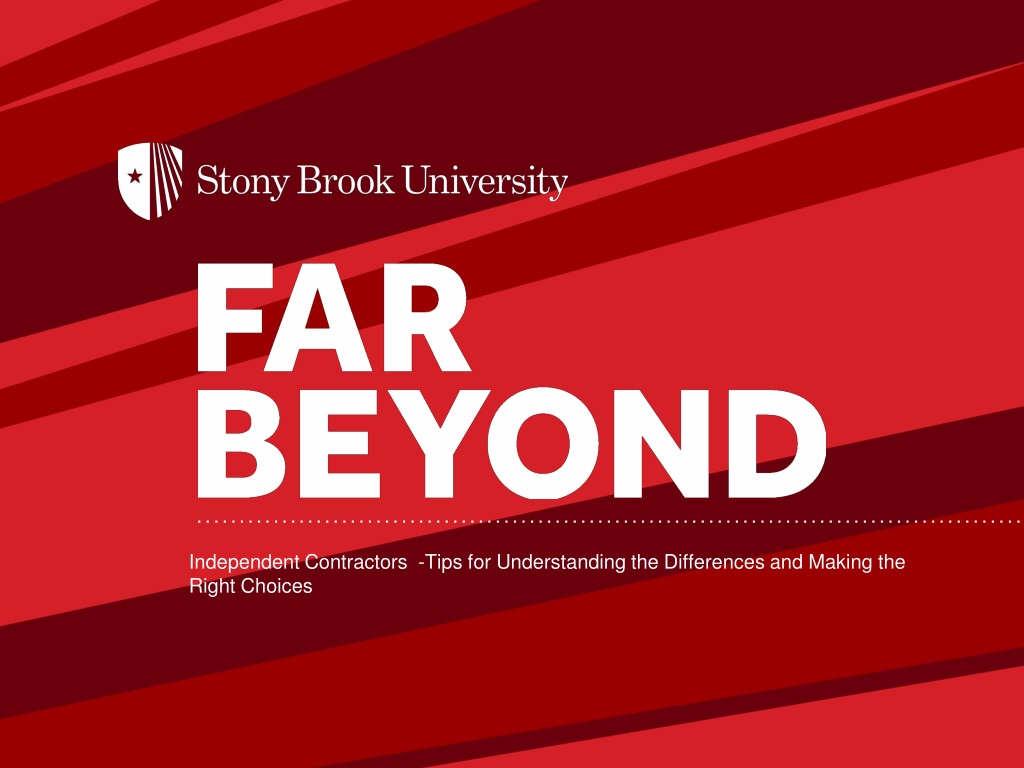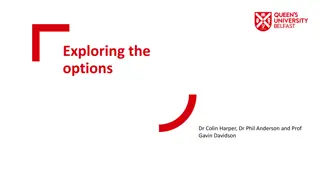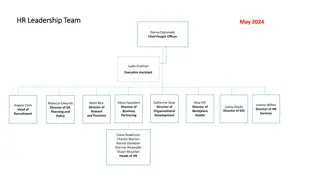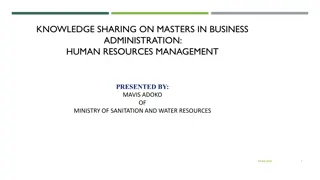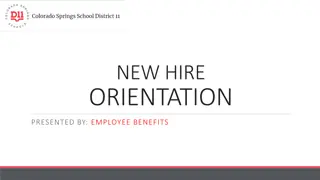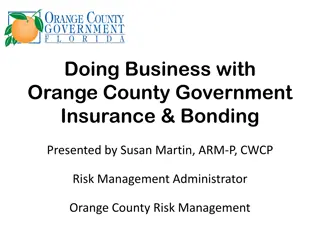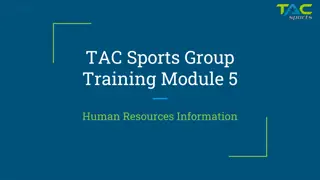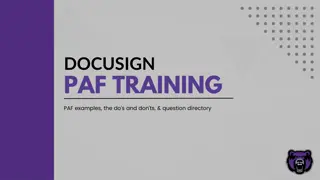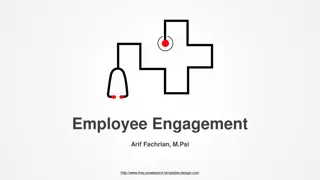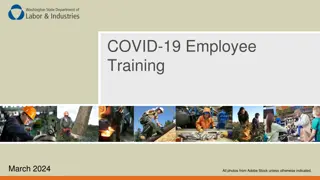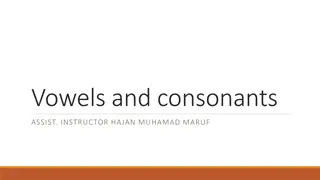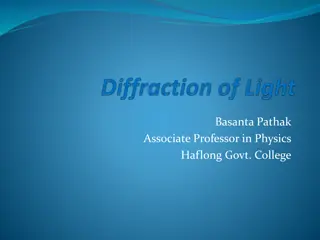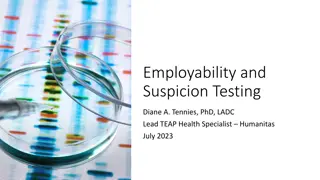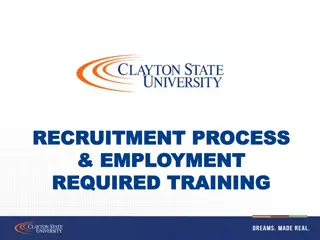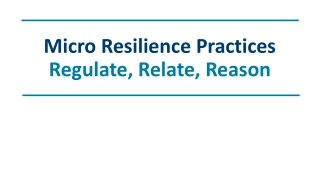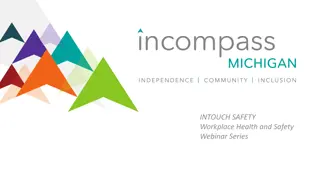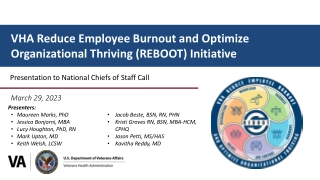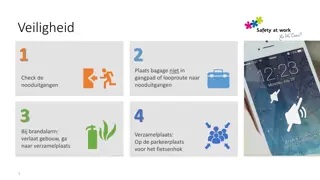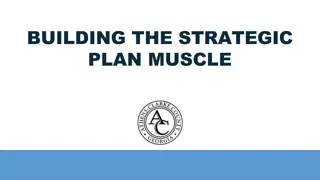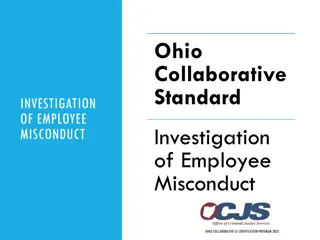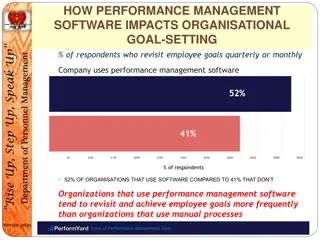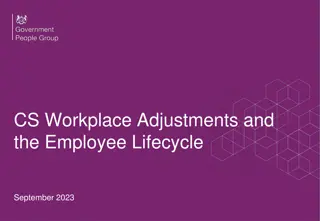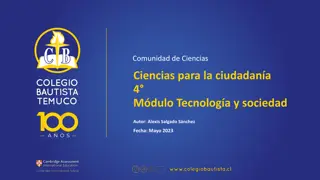Understanding Independent Contractors and Employee Distinctions
Learn about the differences between employees and independent contractors, including key definitions, honorarium distinctions, the US Dept of Labor wage and hour guidelines, factors determining the relationship of parties, and the IRS 20 factors of the common law test.
Download Presentation
Please find below an Image/Link to download the presentation.
The content on the website is provided AS IS for your information and personal use only. It may not be sold, licensed, or shared on other websites without obtaining consent from the author. Download presentation by click this link. If you encounter any issues during the download, it is possible that the publisher has removed the file from their server.
Presentation Transcript
Independent Contractors -Tips for Understanding the Differences and Making the Right Choices
WELCOME Today s Agenda Today s Agenda Today we will hear from subject matter experts on: Is it an Independent Contractor? Procurement Facts Export Controls Do s and Don ts Visa and Immigration Get the Facts
BASIC DEFINITIONS Employee: An individual who provides services, is subject to the control and direction of the organization regarding what will be done and how it will be done. Independent Contractor: An individual who follows an independent trade, business or profession, in which they offer their services to the public and complete such services free of control or direction from the payer as to the means and methods used to complete the task.
Honorarium Honorarium: Guest lecturers, speakers, and performing artists providing services of a short duration. Guest Speakers: Individuals having specialized knowledge on a particular subject, engaged to convey this knowledge to an audience, in return for an honorarium or established fee. Performing Artists: Individuals engaged to perform work in a recognized field of creative arts such as music, dance, theater, etc.
RELATIONSHIP OF PARTIES Facts which illustrate how the parties perceive their relationship include: 1. A written contract describing the intended relationship 2. Whether the business provides employee-type benefits 3. The permanency of the relationship will the relationship continue indefinitely? 4. Whether the services being provided are a key activity of the organization. No fact by itself is decisive, and all facts must be considered in making a determination.
IRS 20 FACTORS OF THE COMMON LAW TEST 1. Does worker control means and methods of how the work is done? 11.Does the worker submit regular status reports? 12.Will the worker be paid at the completion of job? 2. Is worker supervised or trained by the department or University? 13.Will the worker be reimbursed for business or travel expenses? 3. Is the service part of the regular activities of the department or University? 14.Does the worker provide own instruments or tools? 4. Must the worker provide the services personally? 15.Does the worker have an investment in facilities used to perform services? 5. Does the worker have the option to delegate work (to non-employees)? 16.Can the worker incur financial loss if services are not provided? 6. Is there a continuous relationship between department & worker? 17.Does the worker have multiple sources of income from services provided? 7. Does the worker establish routine or schedule of work to be performed? 18.Does worker provide services to the public? 8. Is the service/project of relative short duration? 19.Can the University fire the worker if services are being performed? 9. Will the work be performed at University premises? 20.Can the worker quit at any time without incurring a liability? 10.Does the worker set the order/sequence of work to be performed?
PENALTIES FOR MISCLASSIFICATION There are significant penalties for classifying a worker as an independent contractor when they meet the criteria for employee classification. On both the state and federal level, the premise is that every worker is an employee until proven otherwise. Penalties for misclassification can vary and may include providing retroactive benefits, including vacation pay and 401(k) contributions, stiff financial penalties, and in some cases criminal charges, and back payment of taxes including interest even if the IC paid the taxes already. It is extremely important to obtain IC approval via Human Resources before committing to contracting an Independent Contractor. If you need assistance in making the right determination, visit the HR website at and use the Independent Contractor Tool at http://www.stonybrook.edu/hr/misc/ic/.
POST EMPLOYMENT RESTRICTIONS We check the State and RF systems to make sure IC s are not currently a New York State/Stony Brook University/Research Foundation/Stony Brook Foundation employee; they have not been a New York State/Stony Brook University employee for the past two years; and they have not been a Research Foundation employee in the current calendar year. If they are active they would need to be paid through extra service.
QUIZ YOURSELF You wish to have a guest speaker one time, payment of $500.00. Question: Honorarium/IC Yes, No, It depends
QUIZ YOURSELF Answer: It depends. If worker is currently or formerly employed by the state of New York (within 2 years) or currently or formerly with The RF for SUNY in last year not honorarium/IC
QUIZ YOURSELF Question: Is this an IC? You wish to have administrative support because someone in the department left?
QUIZ YOURSELF Answer: No Since this is part of the regular activities of the department or SB University the worker should be paid as an employee.
PROCUREMENT FACTS When using NYS funds departments must provide justification for payee selection and evidence of price reasonableness of the independent contractor for payments over $2,500 and at $50,000 if using RF funds. A formal contract is required for any IC performing services in excess of $20,000. When using New York State funds, payments for $50,000 or more require a contract reporter ad, formal contract and purchase order in addition to the normally required I/C documentation. Only the President or President's designee (e.g. Associate VP for Procurement or Director for Strategic Procurement) have signature authority to financially obligate the NY State or the RF for SUNY. A department head/chair/dean etc. is not authorized to make these commitments on behalf of the SB University.
INDEPENDENT CONTRACTOR VS INDEPENDENT CONTRACTOR VS VENDOR PAYMENT VENDOR PAYMENT Determining whether an individual is paid as an independent contractor or a vendor is based on the taxpayer ID number (TIN) provided on the NYS Substitute Form W-9. If the individual completes the form using a social security number (SSN), they will be paid as an individual and the tax reporting will be done against their SSN. If the individual completes the form using an employer ID number (EIN), they will be paid as a vendor, and the tax reporting will be done against their EIN. If the individual completes the form using both a social security number (SSN) and an employer ID number (EIN), they will be paid as a vendor, and the tax reporting will be done against their EIN. For payments to a vendor using an EIN, the procurement process must be followed where a purchase order is issued For payments to a vendor using an EIN, the procurement process must be followed where a purchase order is issued to the vendor before they provide their goods or services. Departments should submit these requests through to the vendor before they provide their goods or services. Departments should submit these requests through Wolfmart on a Service Request form and upload their Scope of Work as an Internal Attachment. Wolfmart on a Service Request form and upload their Scope of Work as an Internal Attachment. For NY State and RF for SUNY funded payments, all payees must be added to the respective vendor file for IRS tax reporting purposes. A payee s honorarium or independent contractor payments totaling $600.00 or more per tax year will result in an IRS 1099-MISC being issued to them by either NY State or RF for SUNY.
REQUIRED TAX FORMS Used by U.S. Citizens and resident aliens to report their social security or The number provided is used by the payer to report payments other NYS Substitute Form W-9: individual tax identification number. than expense reimbursements to the independent contractor. Given to the withholding agent or payer. Form W8-BEN: The W-8BEN is completed to establish that the person is not a U.S. citizen and/or to claim they are the beneficial owner of the income for which the form is being provided. Given to the withholding agent or payer. Form W-7: (Application for IRS Individual Taxpayer Identification Number ) Nonresident aliens who receive compensation from U. S. sources must provide a tax identification number. If they do not have, and are not eligible for, a social security number, they must complete this form to obtain an individual taxpayer identification number (ITIN). This number is used to report compensation for services. It is used when completing a Form 8233. (Remember, without a tax identification number, we are required by the IRS to withhold 30% tax.) Form 8233: Used by nonresident aliens to request an exemption from withholding tax when they are residents of a foreign country with which the United States has an income tax treaty. All Non-Resident Aliens (NRA) that perform a service in the U.S. will be taxed at 30% withholding unless a tax treaty exists in their country of citizenship with the U.S. It is the responsibility of the University department engaging the NRA Independent Contractor and/or the Independent Contractor to include form 8233 with the Independent Contractor paperwork. To determine tax residency for tax withholding purposes, a Request for Alien Information and a Substantial Presence Test should be completed. RF Request for Alien Info Form: https://www.rfsuny.org/media/RFSUNY/forms/apfrm057.pdf
IN SUMMARY There are many facets to the Employee, Employer, and Non-Employee business relationship. For additional assistance please visit the following websites and take note of the department contacts: Human Resource Services: 390 Administration (631) 632-6155 Independent Contractor Tool: http://www.stonybrook.edu/hr/misc/ic/ The Office of Grants Management W5510 Frank Melville Memorial Library ogm_ovpr@stonybrook.edu (631) 632*9038 Procurement Office Procurement Office https://www.stonybrook.edu/procurement/ https://www.stonybrook.edu/procurement/ Research and Development Campus, Building 17 Tel: (631) 632-6010 Stony Brook Foundation, Inc. Stony Brook Foundation, Inc. 230 Administration (631) 632-6536
RESEARCH SECURITY AND EXPORT CONTROLS
EXPORT REVIEW Prior to engaging in activities with an Independent Contractor, the University is obligated under U.S. government regulations and sponsor policies to ensure that we are NOT: Doing business with a denied party; Reporting of, and obtaining prior approval for, international engagements (as may be required); Partaking in activity that is prohibited by a U.S. government embargo or sanction program; Sharing or receiving export controlled technical information and/or items. Ensure that we: Document the review and if applicable, further document any license exceptions.
SCREENING: FEDERAL LISTS IS THE INDEPENDENT CONTRACTOR A RESTRICTED PARTY? WE NEED TO CONDUCT A SCREENING There are over 50 different lists issued by U.S. governmental agencies that restrict transactions with specific individuals, groups and entities. The University uses Descartes Visual Compliance software (VC), an internet based program, to complete Restricted Party Screenings. Self-register: https://www.visualcompliance.com/usr. Use your @stonybrook.edu email address! How to conduct a restricted party screening: https://www.stonybrook.edu/commcms/export-controls/Guidance-and- Procedures/VC-Screening-Directions.php
EXPORT LICENSES DO WE NEED SPONSOR APPROVAL OR DO YOU NEED TO REPORT IT TO THE SPONSOR? IF THEY ARE A NON-U.S. PERSON AND WORKING ON/FOR A SPONSORED PROJECT - DO YOU NEED SPONSOR APPROVAL OR DO YOU NEED TO REPORT IT? Sometimes, it depends on the situation and the sponsor! If the independent contractor was not named in the proposal, then consult with the Office of Grants Management before starting the engagement. Some sponsors require prior approval for activities outside the U.S. and some require reporting the activity.
EMBARGOED AND SANCTIONED COUNTRIES DO WE NEED U.S. GOVERNMENT AUTHORIZATION TO DO BUSINESS WITH THE INDEPENDENT CONTRACTOR? IF WE ARE (A) SENDING/RECEIVING INFORMATION AND/OR (B) PROVIDING COMPENSATION TO AN INDEPENDENT CONTRACTOR IN (OR ORDINARILY RESIDENT IN) AN EMBARGOED/SANCTIONED COUNTRY, DO WE NEED A U.S. GOVERNMENT AUTHORIZATION? Sometimes, it depends on the embargo/sanction program. Consult with the Director for Research Security before the engagement begins! https://home.treasury.gov/policy-issues/financial- sanctions/sanctions-programs-and-country-information
EXPORT LICENSES DO WE NEED AN EXPORT LICENSE TO DO BUSINESS WITH THE INDEPENDENT CONTRACTOR? IF WE ARE SENDING OR RECEIVING TECHNICAL INFORMATION/ITEMS WITH THE INDEPENDENT CONTRACTOR, DO WE NEED AN EXPORT LICENSE? Release (verbal, email, domestic shipment) of export controlled technical information to a foreign national within the US may require a deemed export license. Acceptance of export controlled technical information on campus may require a deemed export license if the information will be shared with a foreign national on campus. Physical shipment of export controlled technical information/items to an international destination may require an export license.
VISA & IMMIGRATION SERVICES http://www.stonybrook.edu/visa
NONIMMIGRANT STATUS Nonimmigrants or nonresident aliens are people coming to the U.S. temporarily who have no intention of abandoning residence in their home country. The status granted to the individual dictates the U.S. regulations the nonimmigrant and the sponsor or host institutions must follow. Such regulations may restrict nonimmigrant activities. An individual s status will be indicated on the Form I-94. I-94 records can be retrieved at CBP.gov/I94 or as part of the I-797A.
COMMON NONIMMIGRANT CLASSIFICATIONS B-1 and W-B (Tourists for Business), B-2 and W-T (Tourists for Pleasure) B-2 and W-T tourists should NOT be independent contractors. B-1 and W-B tourists may be eligible to be independent contractors based on the below: 9-5-6 rule: While the activity for which the business tourist is to be paid will last no longer than 9 days, AND the visitor will be paid by no more than 5 other U.S. institutions in the past 6 months, AND services are provided for benefit of the institution, tourists can be reimbursed for actual expenses incidental to their stay AND accept an honorarium. If the 9-5-6 rule does not apply, payment is limited to reimbursement for actual expenses, if the services provided are for the benefit of the institution. All services provided must be appropriate for the tourist category. F-1 Students F-1 students should NOT be employed under the independent contractor mechanism. There are other mechanism for employments, and F-1 students should consult Visa and Immigration Services.
COMMON NONIMMIGRANT CLASSIFICATIONS, CONT D. J-1 Exchange Visitors Generally, independent contractor arrangements are not appropriate for J students until they are eligible for Academic Training. The independent contractor related activity must be permissible under federal regulations for the status and category; however, generally, reimbursement for actual expenses and an honorarium can be paid IF the sponsor provides an authorization letter. Exchange Visitors scholars sponsored by SBU s own program require specific written authorization to be paid as an independent contractor. All employment and authorizations for activity sites must be specifically approved by the sponsor s Alternate/Responsible Officer and listed in the federal Student and Exchange Visitor Information System (SEVIS).
COMMON NONIMMIGRANT CLASSIFICATIONS, CONT D. H-1B Skilled Worker and O-1 (Alien of Extraordinary Ability) SBU and RF employees in these categories cannot be independent contractors, as their employment is rigidly defined in the petition filed on their behalf. Federal regulations and institutional policies prohibit the two relationships to exist concurrently with the same employer. H-1B and O-1 workers from other institutions can only be reimbursed for reasonable expenses for activities such as guest lectures if they are incidental of the employment and the nonimmigrant does not derive a monetary or material gain from those activities. Some highly-regarded speakers/performers in the O-1 category will use an agency to book their services, so payment for a performance to the agency is permissible, whereas payment as an independent contractor would be more limiting. TN Canadian or Mexican (Trade Agreement Worker) SBU and RF employees cannot be independent contractors, as their employment is rigidly defined in the petition filed on their behalf.
